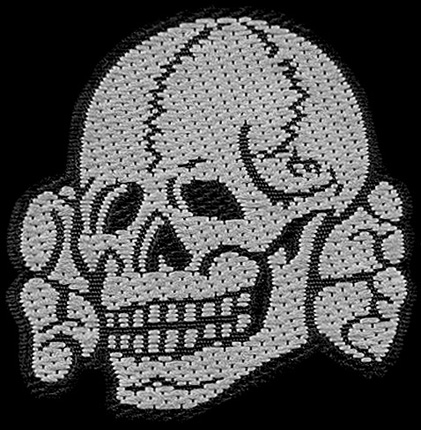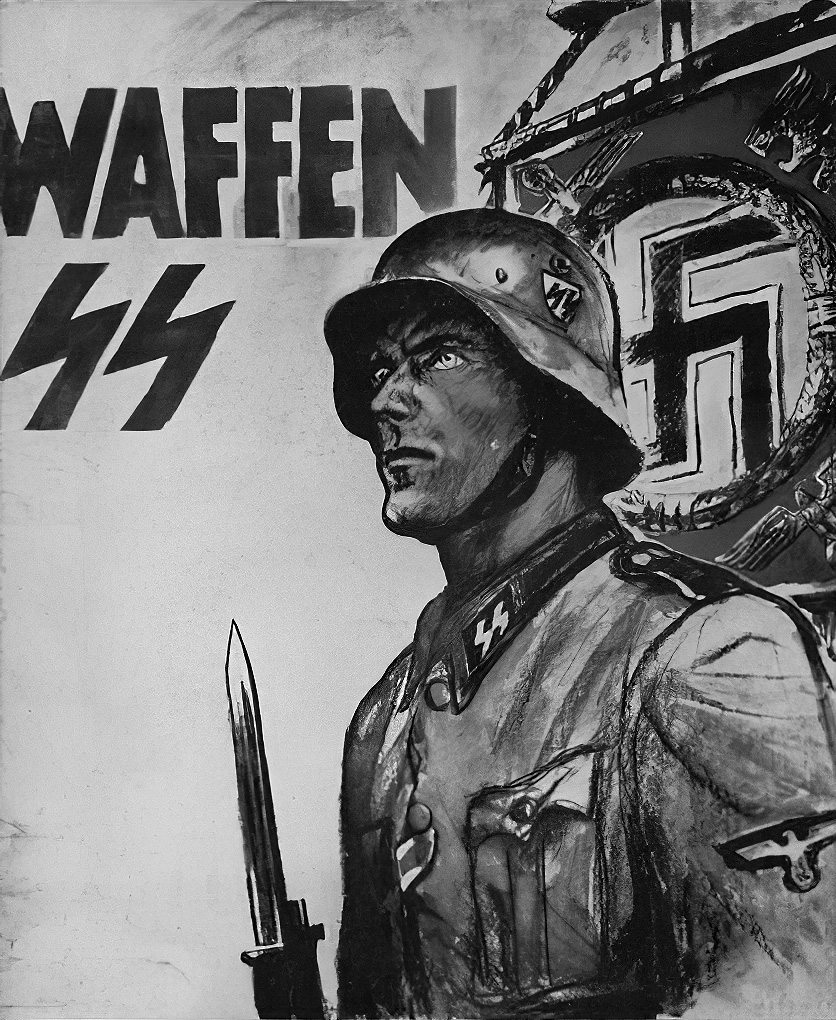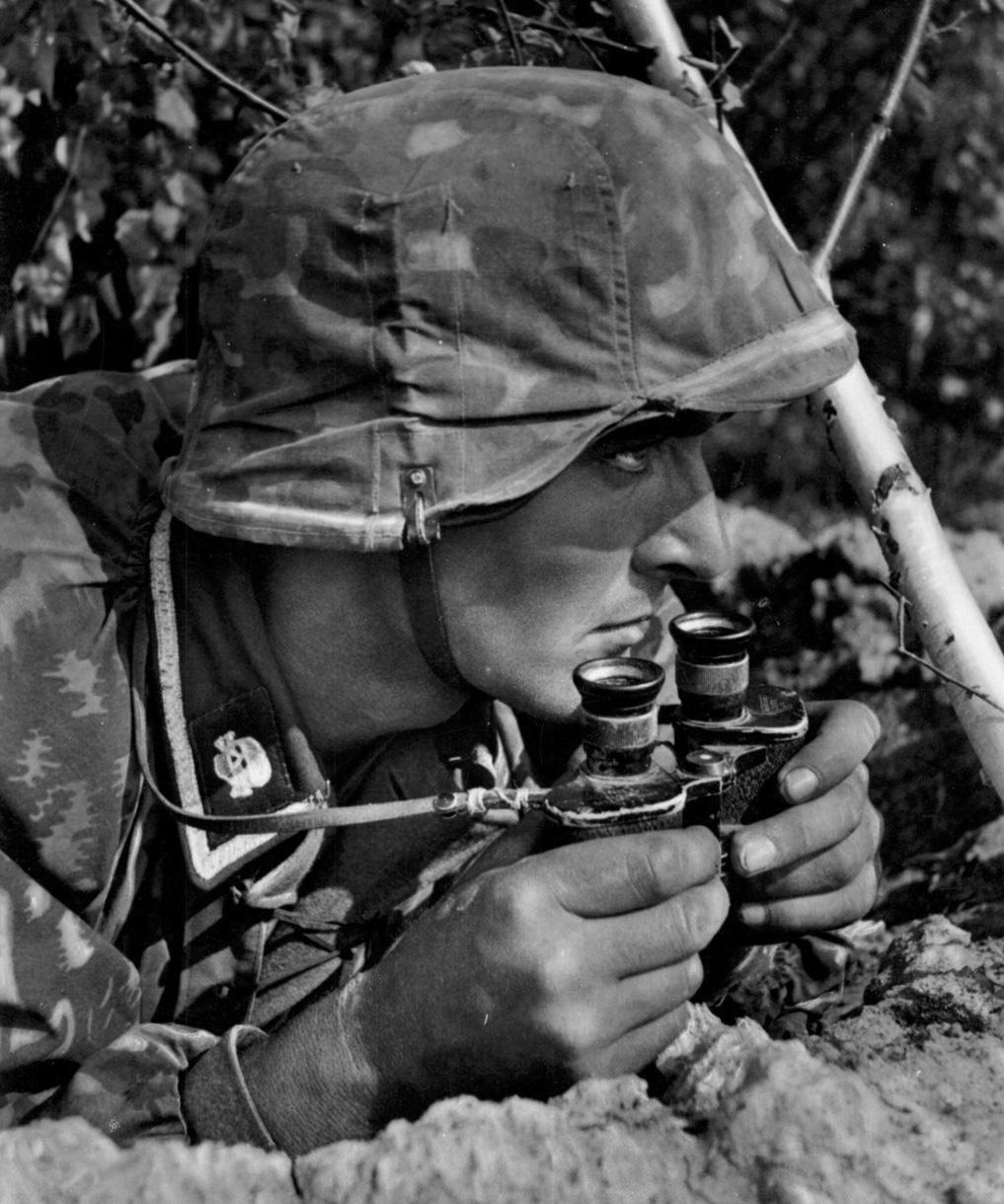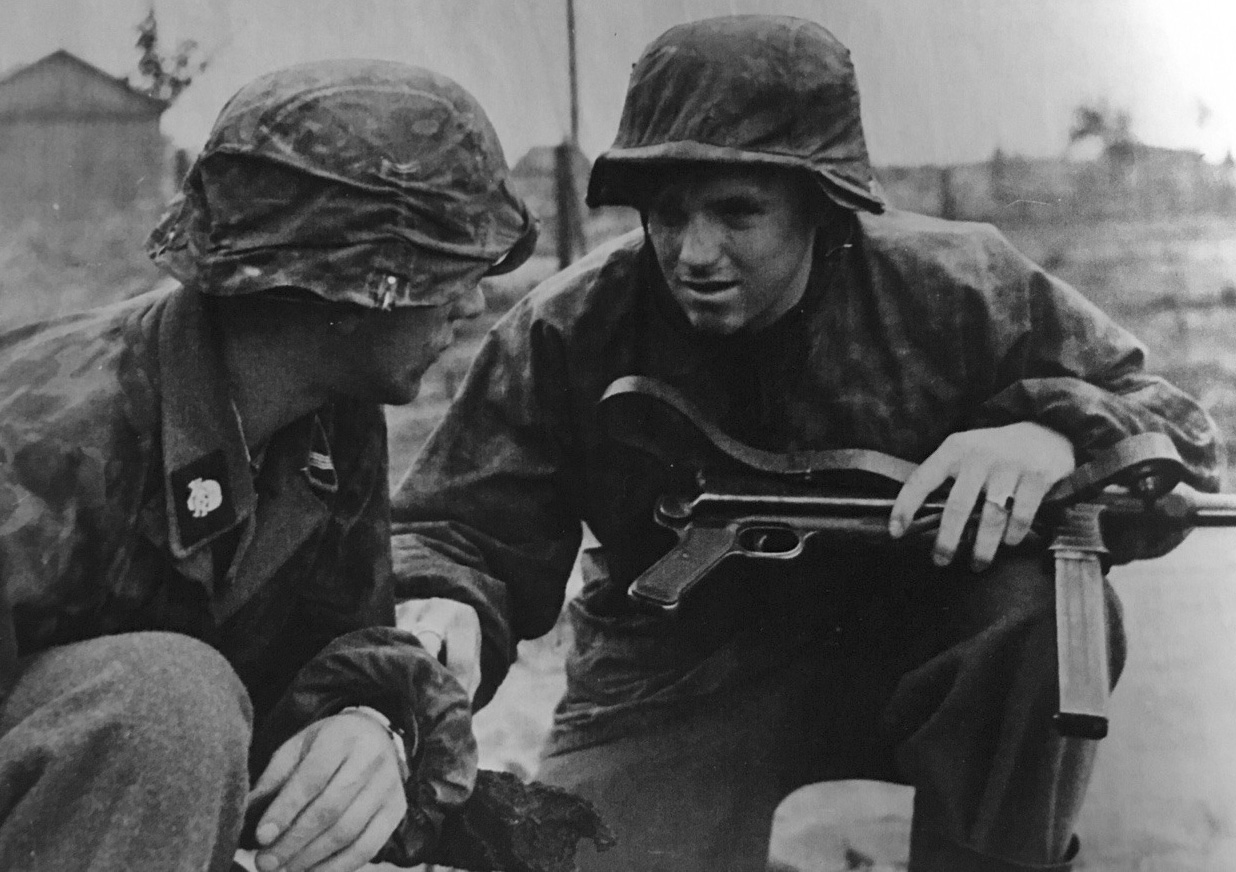

Interview Scharführer Hans Thiesen from Totenkopf Division, October, 1998.




Interview Scharführer Hans Thiesen from Totenkopf Division, October, 1998.


Hans: I was going to be called to duty for the class of '21 in 1941 I believe. A friend of mine had already enlisted in the SS a year earlier so I figured I would volunteer instead of being conscripted. My training was in Munich, which was close by as I lived in Fürth [a city in northern Bavaria, Germany].
What do you remember of your training?
Hans: I remember it was very tough, lots of focus on strength and weapons proficiency, we had a lot of exercise, marching, drilling with the K98 and keeping it clean, learning our equipment, and studying the tactics of our enemies. Many in the Totenkopf training battalion were combat veterans from France or the first war.
They really made sure we understood what we were fighting for, and how to achieve victory. I was in training while the campaign against Yugoslavia and Greece was happening; we were filled with a zest to get in the fight. The war was going very well for Germany at the time and we felt the final victory was shortly to pass. In May, all of my training was complete and I was sent to join the Totenkopf Division in East Prussia.
There was an excited feeling that something big was going to happen. When I arrived all leave was canceled and all personnel were ordered to report back to the division. We had new equipment, and our days were filled with keeping it ready and learning how to use it. I was assigned to the 2nd Kompanie as an infantry man.
Can you tell me about the opening of Barbarossa?
Hans: Yes, I remember the weather was very pleasant for the time I was in East Prussia. I had time to go around and meet farmers to arrange for food. One farmer had two daughters my age so I liked to stop by very often for milk and eggs. I asked for permission to write them, and stayed in contact until the very end of 1944, never knowing what happened to them at war's end.
On June 20, we were under cover of trees, and it was ordered that all vehicles be hidden and camouflaged. We had a terrific sense of duty, that for the last time the Bolshevist menace to the world would be over. On June 21 our leaders pulled all battalions in for briefings, ours spoke for roughly an hour. He said a great battle was about to begin between Germany and our allies and Jewish Bolshevism. He was a professor before the war, and studied Russia and its history; he said to prepare for a long war, but hope for a short campaign. Something I should like to mention to you is that he stressed to us that we would be at war against an ideology, not the Russian people. He told us to steel ourselves to the hardness with which the enemy could fight, and that we must be harder. At the time I paid no attention to all the distant noises, but when I knew what we were preparing for, it hit me like a rock. I could hear tank engines, trucks, and trains, I was afraid the Russians would hear them too.
I could hardly sleep that night, and then early in the morning it started. I was awoken by the drone of aircraft engines, and shortly after artillery in the distance. It was starting. We entered Russian held territory with no action. We could see smoke in the distance and hear the sounds of battle, but Totenkopf advanced with no enemy contact. We saw enemy soldiers being marched to the rear; their new looking uniforms and equipment impressed me.
We stopped after 4 hours of marching, and a few Wehrmacht soldiers had prisoners. Our Obersturmführer went over to speak to them and give them water. He told us later that they were happy to be captured and asked if they could help us. That was surprising, but the speech I heard the night before rang out, we are at war with an ideology, not the people. We started to see more and more prisoners on the roads, I was surprised to see so many. It was said that Stalin wanted to attack us, and these vast numbers of men and equipment we saw support this.
What was your impression of the Russian soldier?
Hans: At the beginning of the war, it was very favorable; at the end, I hated them due to their barbarity and cruelness. The first prisoners we took were European Russians, they hated the bolshevists as much as we did, and they wanted their country freed. We ate with a group of officers who were captured, and our Obersturmführer translated, saying they had been forbidden to worship, lived in poor housing, and when asked about the condition of Jews, said they all lived in good areas now, unlike during the Tsar, who kept them in ghettos.
They felt the Jews had a leading role in the revolution, and kept their heel on the Russian people's throats. Many of their friends disappeared without a trace, and asked if we could investigate after we won. Our leaders decided that we could allow some of the prisoners to stay with us if they wanted, the officers would go back to Germany for debriefings, and talk was running high how many would join us to fight. I want to add that in the beginning, we felt no hatred to the Russians, they came out to greet us with what little food and drink that they had. They looked so poor and wretched.
One soldier in my platoon was disciplined because at night he left to go see a Russian girl who came out to greet us with eggs and milk. He came back with a smile on his face and her address so he could write her. Our CO was not amused and gave him dirty chores to attend do. He said it was completely worth it though. When we came to rest after each day, there were always Russians who offered us food and shelter. The prisoners were always well treated and properly fed. I do not recall any instances of escape or abuse.
The Red Army became more Eastern-looking by 1942, and the attitude changed in the way they fought. In the beginning there were no reports of atrocities or breaches of law by the Russians. As the war went on, reports started circulating of German soldiers being murdered after surrendering and civilians killed for helping us. One instance I remember was in 1943, partisans attacked a farming town that was very friendly to us and killed all the adults. We entered the town to find it on fire with bodies strewn everywhere. Animals were missing and children were left by parents where they lay.
All felt a sense of rage, our CO said any partisans caught would be executed after interrogation, no exceptions, and he asked that flyers be dropped in the surrounding areas saying that we will find who did this and punish them. When we would bring in prisoners, they now had a sense of superiority, that they knew we were out-numbered, and they would beat us. Gone were days of respect and friendship like in 1941. The Red Army soldiers had an air of hatred that their propaganda woke up in them. Yes, we were the invaders, but we invaded to thwart an attack on us, and to free the Russian people from Jewish Bolshevism. The propaganda they were being fed made this war a war of Russians against Germans, they made it personal instead of ideological.
Because of this, it was easy for them to kill the invader, and to be cruel while doing it. In most cases, we were ordered to show civility to any surrendered soldier in uniform, anyone caught fighting out of uniform could be shot on sight. During the Kursk battle we treated many wounded Red Army soldiers alongside ours. Even at the last stages of the war, once the fighting stopped, we always treated surrendered enemy within the law. What is written today is not true; we never killed surrendered soldiers, and had no orders to do so.
[Above: The grim determination of a Waffen-SS Totenkopf knight.]

Did you ever witness Red Army atrocities?
Hans: Yes, I saw executed German soldiers, shot in the back of the head, civilians executed after being raped and appearing tortured, and nurses murdered after an aid station was overrun. The war on the Eastern Front was vicious, with many ethnic groups fighting centuries old wars and exacting revenge for perceived crimes. Ukrainians were quick to volunteer to fight and exacted revenge on any Jew they came across, as they blamed them for the atrocities suffered during Stalin's Great Famine [Holodomor].
I was part of a firing squad for five Red Army soldiers who had been tried for attacking a Reichsbahn outpost, killing the men after tying them up. They were caught by loyal Cossack's who told our CO they admitted to killing all personnel due to the tough fight they put up. It was tough duty, but that was the nature of the front.
Most of what I saw were attacks on civilians by the Red Army, who had a hatred of anyone who was behind the lines, they correctly assumed they were helping us and giving us shelter. Many a German soldier could thank Russian civilians for giving them food and shelter. We in turn took care of them, we helped rebuild their farms, and made sure they had good medical care. We lost a medical orderly who went to a small town to deliver a baby; on his was back a Red Army patrol or partisans shot him.
In 1944 while in Hungary we retook a small town where the Red Army pulled most all civilians out of their cellars and shot them, the survivors were in complete shock at the evilness. We attacked the division that was responsible that same day and showed no mercy. Our barrels were red hot at the constant firing; no prisoners were taken that day as we gave them no time to surrender. By the sheer overwhelming numbers of the enemy, we had to pull back as ammunition was getting low.
The SS Totenkopf Division stands accused of some very bad atrocities, both in France and in Russia. What is your opinion about these claims?
Hans: Utter shit, the Totenkopf Division fought with honor and humanity on every front. I was not in France, but I do not believe the Allied claim that British soldiers were murdered. I never heard a word of this by any comrades, some were at Le Paradis. I did hear stories regarding negro soldiers who were abandoned by their French masters who then proceeded to loot nearby farms, and attacked several French who protested. When they were caught, they were tried and executed for looting and murder.
In Russia, as I stated, we treated the Russian people with kindness and respect and they returned the kindness. It was only when the partisans started attacking those who aided us, their sentiments turned to fear and they were less likely to help us as they previously did. The reprisals that the media loves to show have been exaggerated, and completely misunderstood.
When partisans attacked, they killed whomever was by the target, whether it was derailing a hospital train, attacking a town where a German unit was resting, or killing those suspected of helping us, many innocent people died. When we caught partisans, they were interrogated then either hung or shot, we took photos of this to document how cruel this business was. I am sure we grabbed some who really were innocent, but we relied on police science and eyewitnesses to bring these criminals to justice. We did not just go grab someone out of a crowd and hang them.
They would many times wear German uniforms when attacking an area who was friendly to us. A friend who served in the Polizei Division confirmed that they captured many a partisan and even Red Army soldiers behind the lines wearing German uniforms. I believe they were hunting friendly villagers, killing a few unlucky bystanders, all to sow hatred against us. I never saw a German mistreat a Russian civilian, we had such strict rules that even taking an egg without paying would get you in serious trouble. The only times these rules were relaxed was towards the end when we were just trying to survive, and many farms and homes were already abandoned, then we would take what we needed to survive.
Were you ever wounded?
Hans: Yes and my wounding probably saved my life more than once. I hold the wound badge in silver due to multiple wounds received. My first wound came during the Red Army attacks in late December of '41, I was close by Demjansk [Russia] and I was hit in the shoulder while helping pull a 37mm anti-tank gun. I went down, and ended up being sent back to the General Government [Poland] area to recover. I was in the hospital until March '42, so I missed the Demjansk Pocket. Given leave, I rejoined the division in France to rearm and refit.
I was promoted to SS Unterscharführer and felt very blessed to have survived such a serious wounding. My second wound came in February '43 when we returned to the East to retake Kharkov.
Our beloved commander Theodor Eicke was shot down while scouting enemy lines and we attacked the enemy to bring him back. We were outnumbered, and outgunned, but pressed on and broke their line.
I was hit in the leg by machine gun fire. I returned from this wound in time for the Kursk battle and was wounded again, this time hit by shrapnel in the intestines. I was out of the war until early '44. I returned to my unit promoted to a Scharführer, and holder of the EK2 [Iron Cross 2nd Class], Infantry Assault Badge, Wound Badge, East Front Medal, and War Service Cross. My last wound came at the end of '44; I was leading an assault in a SPW [Schützenpanzerwagen] and a T34 [Soviet medium tank] hit us, throwing me out into the snow with a wound to my head and arms.
This last one saved me from surrendering to the Americans, or being handed to the Soviets where so many comrades never came home. I was in hospitals until late May '45, and then sent home to Fürth to recuperate.
What was the end of the war like for you?
Hans: I remember being in a sense of shock, I was thinking how could something that started so perfect end in such horror? I go back to the words of Rudolf Hess during his sentencing at Nurnberg "I had the honor of serving with the greatest son my nation has ever produced, I will stand before my creator, vindicated. Even if I could, I would not choose a different path than the one I took". I too believe I chose wisely and behaved correctly. What I saw my nation turned into by the Allies is beyond description, the death and destruction I saw after the war in our cities left me scarred, but also as a strong witness to tell the truth about what we went through.
[Above: Two Totenkopf soldiers, far away from the lands and people they knew, for their people, for Europe, for the world.]

Back to Interviews